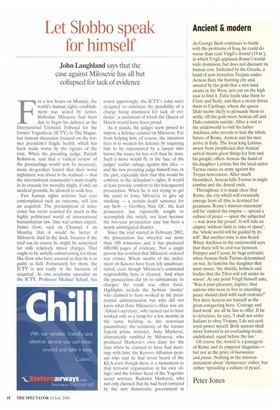Ancient & modern
As George Bush continues to battle with the problems of Iraq, he could do worse than read Virgil's Aeneid (19 BO, in which Virgil applauds Rome's worldwide dominion, but does not discount its human cost. Defeated by the Greeks, a band of now homeless Trojans under Aeneas flees the burning city and, assured by the gods that a new land awaits in the West, sets out on the high seas to find it. False leads take them to Crete and Sicily, and then a storm drives them to Carthage, where the queen Dido seems likely to persuade them to settle, till the gods warn Aeneas off and Dido commits suicide. After a visit to the underworld to visit his father Anchises, who reveals to him the whole future of Rome, Aeneas and his men arrive in Italy. The local king Latinus, aware from prophecies that Aeneas' arrival means great things for him and his people, offers Aeneas the hand of his daughter Lavinia, but the local suitor Turnus raises an army against the Trojan newcomers. After much bloodshed, Aeneas kills Turnus in single combat and the Aeneid ends.
Throughout, it is made clear that Rome, the city which will eventually emerge from all this, is destined for greatness. Rome's mission-statement will be 'control the empire — spread a culture of peace — spare the subjected — war down the proud'. It will rule an empire 'without limit in time or space'; the 'whole world will be guided by its will'. But another tone is also heard. When Anchises in the underworld sees that there will be civil war between Pompey and Caesar, he begs restraint; when Aeneas finds Turnus determined on war, he laments the slaughter that must ensue, 'the shields, helmets and bodies that the Tiber will roll under its waves'. At one point Virgil himself asks, Was it your pleasure, Jupiter, that nations who were to live in unending peace should clash with such violence?' Nor does Aeneas see himself as the great conquering hero. `Courage and hard work' are all he has to offer. If he is victorious, he says, 'I shall not order Italians to obey Trojans; I do not seek royal power myself. Both nations shall move forward in an everlasting treaty, undefeated, equal before the law.'
Of course the Aeneid is a panegyric of Rome and its emperor Augustus — but not at the price of humanitas and pietas. Nothing in the missionstatement about 'democracy' either, but rather 'spreading a culture of peace'.
Peter Jones


























































 Previous page
Previous page